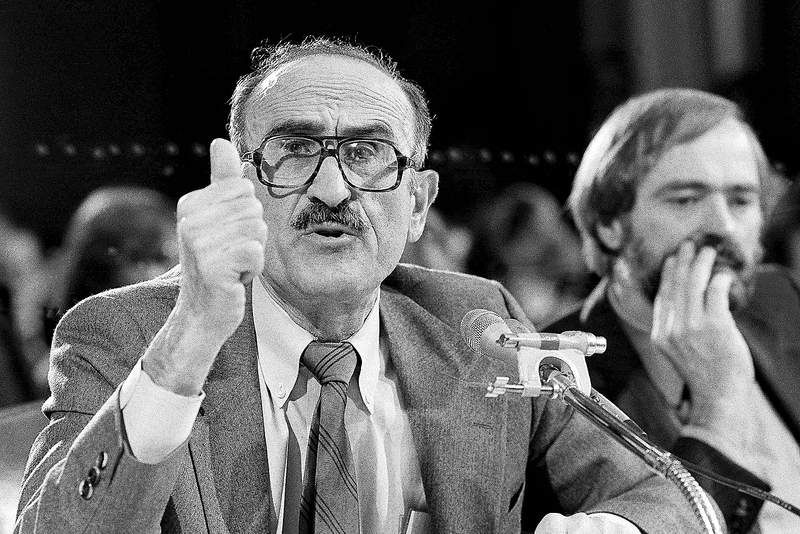Alfred Kahn, 93, mover of airline deregulation, dies
Published 4:00 am Wednesday, December 29, 2010

- Alfred E. Kahn, named by then-President Jimmy Carter to head his new anti-inflation program, speaks to reporters after Carter introduced him at the White House in October 1978. Kahn, who presided over the deregulation of the airline industry during the Carter administration, died Monday. He was 93.
Alfred E. Kahn, a Cornell University economist best known as the chief architect and promoter of deregulating the nation’s airlines, despite opposition from industry executives and unions alike, died Monday at his home in Ithaca, N.Y. He was 93.
The cause was cancer, Cornell said in a statement.
Kahn, a leading regulatory scholar who wielded his influence in both government and academia, helped spur a broad movement beginning in the mid-1970s toward freer markets in rail and automotive transportation, telecommunications, utilities and the securities markets.
Before deregulation, the airlines were tightly controlled by the Civil Aeronautics Board, which approved routes and set fares that guaranteed airlines a 12 percent return on flights that were 55 percent full. The changes Kahn orchestrated resulted in increased competition, lower fares and the rise of low-cost carriers like JetBlue and Southwest. But they also created severe financial problems for the industry, leading to bankruptcies and mergers.
“I have to concede that the competition that deregulation brought certainly was terribly, terribly hard on the airlines and their unions, who had heretofore enjoyed the benefits of protection from competition under regulation,” Kahn said decades later.
Airlines’ financial woes
He added that he accepted “some responsibility” for the industry’s financial problems but said that it had eventually recovered, despite sharply rising oil prices and terrorist-related security costs.
Before he tackled such national issues, Kahn served as head of the New York State Public Service Commission, the regulator for electricity, gas, water and telephones. He introduced pricing that varied by season or time of day, producing efficiencies benefiting utilities and consumers.
But Kahn proved virtually helpless when, as the Consumer Price Index jumped in 1978 to 8 percent, President Jimmy Carter persuaded him to become inflation “czar” and to serve as chairman of the ill-fated Council on Wage and Price Stability, a job described by a sympathetic friend as serving as fire chief to a pyromaniac.
Before long in his new post, the voluble Kahn, shunning “recession” as a euphemism, warned of a “very serious depression” if inflation were not tamed, prompting a private rebuke by the president’s chief domestic policy adviser, Stuart E. Eizenstat.
So instead, Kahn began referring in public to a possible economic downturn as a “banana,” only to be chided by the president of the United Fruit Co. and induced to shift once again to a different euphemism, “kumquat.”
Kahn, operating without staff of his own and with inflation accelerating to above 10 percent, became so frustrated in late 1979 that he asked to be relieved of the job. “I can’t figure out why the president doesn’t fire me,” he joked grimly at the time. “Actually, I do know,” he added. “Nobody would be foolish enough to take this job.”
His most significant public policy impact was undoubtedly as chairman of the Civil Aeronautics Board, which he joined in 1977 under pressure from Carter and Vice President Walter Mondale. What Kahn had really wanted was to head the Federal Communications Commission.
“I don’t think it’s my highest aspiration to make it possible for people to jet all over the world when the future clearly has to belong to substituting telecommunications for travel,” he recalled in a 2008 interview for this obituary, explaining his lack of enthusiasm for the civil aeronautics job.
An academic, Kahn knew almost nothing about the airline business — to him planes were just “marginal costs with wings” — but he quickly mastered the arcana and politics of routes, pricing and costs.
‘Perfect man’ for job
“Fred was clearly the perfect man to lead the airline deregulation effort,” said John Shenefield, a Washington lawyer, in a 2003 tribute as Kahn accepted an award from the American Antitrust Institute. “The climate had been prepared by the Ford administration, but it was the commitment of President Carter that made deregulation possible. And it was Fred Kahn, Carter’s field general for deregulation, initially in the airlines and later on with surface transportation, who made the difference.”
Kahn, drawing on considerable gifts of persuasion and media insight, led the struggle for enactment of the Airline Deregulation Act of 1978, the first total dismantling of a federal regulatory regime since the 1930s.
Washington, he argued in various settings, had long fostered airline inefficiency and by thwarting competition was enabling carriers to keep fares artificially high.
While the industry was financially battered by the new law and some smaller cities lost service, Kahn over the years stoutly defended his handiwork by saying that many more Americans were flying with greater choice of carriers and at lower fares than ever before.
Alfred Edward Kahn, known as Fred, was born on Oct. 17, 1917, in Paterson, N.J., the son of Russian immigrants, and came of age during the Depression, which prompted his interest in economics. His father worked in a silk mill, eventually owning one himself.
After taking degrees at New York University and a Ph.D. at Yale, Kahn went to Washington to work briefly as an economist for the Brookings Institution, the Justice Department’s antitrust division and the War Production Board before a 1943 Army stint that ended with a discharge for poor eyesight after basic training.
He joined the Cornell faculty in 1947 after two years at Ripon College in Wisconsin, where he began an extended academic career distinguished by publication of “The Economics of Regulation,” his landmark two-volume treatise, first published in 1970.
At Cornell, he served as dean of the college of arts and sciences and as a member of the board of trustees.






